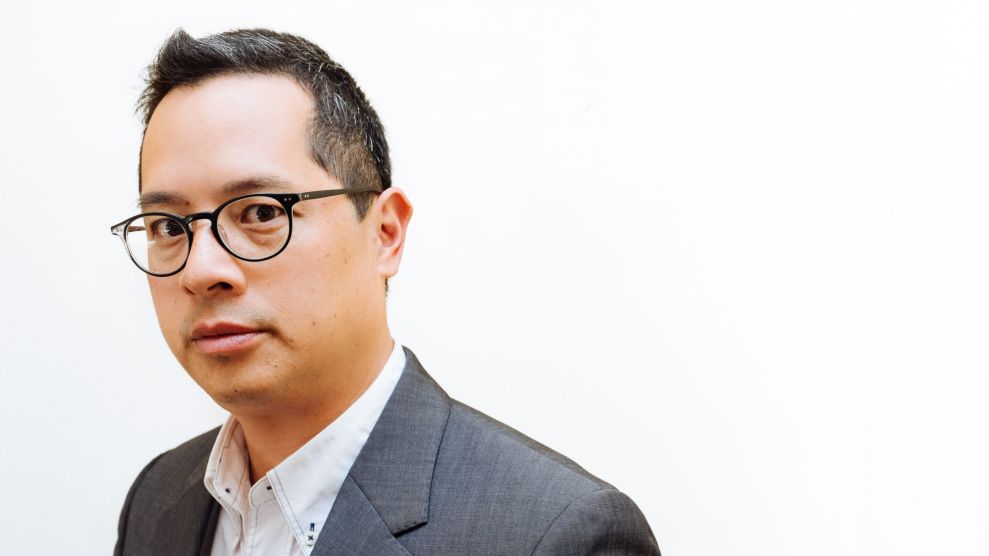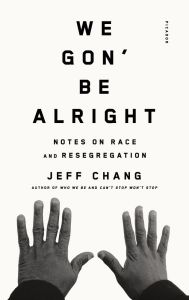
Jeff ChangJeremy Keith Villaluz
Jeff Chang had just finished a book on race in America when Ferguson happened. In November 2014, a month after Who We Be: A Cultural History of Race in Post-Civil Rights America hit bookstores, a grand jury in Missouri decided not to indict Darren Wilson, the police officer who fatally shot Michael Brown. Protests flared in the streets and, in the subsequent weeks, the Black Lives Matter movement became a household name.
“Things changed really rapidly, and all of these issues and questions I had been struggling with for the previous eight years had suddenly moved to the forefront of the national discussion,” Chang, a historian and executive director at the Stanford Institute for Diversity in the Arts, told me. “There needed to be a way of catching up to all that.”

Chang “caught up” by writing We Gon’ Be Alright: Notes on Race and Resegregation, which began as an introduction to the paperback edition of Who We Be. His introduction was framed around a visit to Ferguson for the first anniversary of Michael Brown’s murder, and Chang’s own arrest while demonstrating. With the encouragement of his publisher, the 50-page essay became this book. “I was writing with this urgency, this sort of necessity of trying to be able to capture all these different things I had learned and been taught by the folks of this movement over the last two years,” he said.
We Gon’ Be Alright takes us to Ferguson, dissects #OscarsSoWhite, and, fittingly, begins with a Donald Trump speech in Mesa, Arizona, in December 2015, where notoriously anti-immigrant Maricopa County Sheriff Joe Arpaio welcomed the candidate onto the stage. The issues that Chang tackles continue to be part of the national conversation: safe spaces on campus, housing discrimination, gentrification. But he offers a deeper dive, a broader context of the troubling history of race and segregation in the United States and why it continues to matter today. Chang traces the history of our concerns over college diversity and how increasing housing segregation led to the clashes between police officers and black residents we see today. The effect is both powerful and unsettling: the policing and fatal shootings of black men today become even more devastating when located in a long-running pattern of systemic inequality. “Race makes itself known in crisis, in the singular event that captures a larger pattern of abuse and pain,” he writes in the introduction. I caught up with Chang to discuss his book, Kendrick Lamar, and what he thinks of the notion of a post-racial society.
Mother Jones: What shaped your perceptions of racial dynamics in America?
Jeff Chang: I was born and raised in Honolulu, Hawaii. My family is four generations in Hawaii on my dad’s side, and on my mom’s side, probably five or six. By now, the family has intermarried in all kinds of ways—our family pictures look like the United Nations. Because of them, there’s a way in which I have this really basic, simple—maybe sort of naive, and definitely very corny—view of the world: Why doesn’t this country or society behave like my family does? We have differences, there’s always drama, but we always figure it out at the end of the day because you have to eat from the same table. In a really weird kind of way, that has driven my idealism around race and the necessity of racial justice.
MJ: You talk about some of the issues around diversity on campus. As a historian, do you feel surprised by what’s happening right now?
JC: Sadly, when you look at the list of demands that students were asking for in almost a hundred universities, they’re exactly the same things people were pushing for back in the ’80s and ’90s: more faculty of color, more diversification of the curriculum, cultural sensitivity, multicultural services. That was something that floored me and it made me sad, honestly. On the one hand, I was so…inspired to see students out there, doing this, but it also made me feel like, gosh, what did we really accomplish? You compare the campus climate reports from 1992 and 2012 and they read exactly the same way, and that was disappointing.
MJ: How did you feel while you were writing about all this injustice? When I read We Gon’ Be Alright, I got really sad.
JC: And yet the title of the book is so off from that, right? I suppose, the odds are always against us. Yet despite all of this, I think there’s also a joy in folks discovering the possibility of collectivity. To have a song come along like Kendrick Lamar’s Alright, in which all the lyrics are really about his struggle as a young black man, and yet he can pull out this lyric: “But we gon’ be alright!” It’s poetic. It’s poetic that it would become the anthem of the movement that’s trying to work so hard to get us to make these leaps of faith into a more just, more equal society.
MJ: But you say we’re back to where we were 20 years ago. Why haven’t we made progress?
JC: We get into a cycle where there’s crisis, there’s reaction, and then a backlash sets in. The backlash is always thick: It’s always about making sure the status quo doesn’t change. At some point, the conversation evaporates or moves into magical-thinking territory. There’s an exhaustion or a complacency that sets in. I try to point out that this has been a cycle that’s been repeated over the last 50 years, from 1965, 1992, and 2014 on up till now.
There’s the moment during which the backlash is at its thickest, where those who have come out to call out racism get called racists themselves, where those who are calling out state violence get called violent themselves, where those who are pressing for new ways to be able to live together get called the folks who are promoting the death of society. I feel like we’re in the middle of the backlash right now. But the good news is that we don’t have to stay in this. We simply have to figure out ways to be able to engage in the work of moving against the backlash and not falling into complacency. We’re at the top of the wheel, and we’ve got to stop the wheel before it turns over again. But the moment requires that people get out of the state of being neutral. In moving from being neutral to taking sides, some people are going to have to travel a lot further than others will. Some people will have to unpack their privilege and travel further to meet up with those who are leading.
MJ: Do you mean white people?
JC: Yeah. I think…that’s real. There’s no reason to be cute about it. And that’s partly where I’m writing from when I got to my personal essay on being in between. This is a book that’s directly impacted and inspired by the movement for black lives, and so I couldn’t write this book and not interrogate my own position as someone who comes from Chinese and native Hawaiian descent, as somebody who is an Asian American and a Pacific Islander. In the racial hierarchy, Asian Americans are in between black and white and get to choose to sit these battles out. I had to call out the complexity of the questions that need to be raised within our communities, as well as be frank about my own ambivalence. It’s part of the journey that needs to be made to catch up with those already in the movement.
MJ: You use Kendrick Lamar’s song “Alright” as the title of your book, and you end by analyzing Beyoncé’s Lemonade. What role do you think artists like Kendrick and Beyoncé play in this movement?
JC: Around here, we like to say that “cultural change precedes political change.” There has to be a social imagination for what change can look like before we can manifest it in movements, laws, policies, judicial decisions, and the like. Progressives have to make people believe in a world they can’t yet see. The other side just needs to maintain the bad old status quo. That’s why they use words like “restore” and “make it great again.” They don’t need to call people forward but backward, to some imagined past that always seems better compared to a fearful future. So when Kendrick or Beyoncé talk about being all right or finding freedom, it’s about getting us to overcome our fears and invest ourselves in taking a leap into the unknown.
MJ: What do you think of the idea of a post-racial society—should such a concept even exist, or do you think that race will always matter?
JC: I think everybody would like to not have to think about or talk about race all the time. But it’s different for whites and for people of color. Whiteness assumes that we shouldn’t have to talk about this because the unspoken reality ought to be preserving a system that protects white privilege. People of color would love to move to a post-racial society because it’s just exhausting. Not just exhausting; in some cases it’s fatal. So we’ve gotta deal with race. We’ve gotta put it front and center. What we’ve done over the last 50-plus years is center around the myth that American society is colorblind. Was Keith Lamont Scott seen in a colorblind kind of way? Were Trayvon Martin, Renisha Mcbride, or Sandra Bland seen in a colorblind kind of way?
In 1965, we expressed this national consensus and put into place an infrastructure that would, however weak, move us toward greater racial equity. And over the last 50 years, that infrastructure has been dismantled. We reached peak desegregation in 1989 in public schools, and since that time we’ve gone backward. We have a new division, even as we’re becoming a more and more diverse country by day. That’s a recipe for serious dislocation and insecurity in the future if we don’t address it now. I write toward the future that my children and their children and their children are trying to live, and I would hate for us to be here, in this moment of the crisis cycle, and to just allow the wheel to turn over again. That’s the kind of urgency at play here.
MJ: When you wrote this book, did you have a particular reader in mind?
JC: I want everybody to read it, but I think I was writing for the person who might be on the fence. The person who might be disengaged, the person who might really enjoy and love pop culture—and by extension, black culture—but not necessarily understand what all the fuss is about. People like my neighbors, my cousins, the people at the market, the people who I sit down and talk with about hip-hop all the time. All these folks, young, old, in-between. If we’re all going to be minorities soon, we need to be able to find a new majority that’s committed to reversing the mistakes of the past.
















